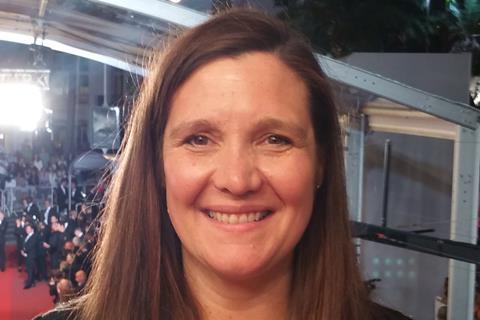
The figures are stark.
The Bafta and Oscar-winning 20 Days In Mariupol, released by Dogwoof in the UK and Ireland to rave reviews in October 2023, grossed just £41,813 after 27 weeks at UK and Ireland cinemas. French documentary On The Adamant won the Golden Bear at the 2023 Berlinale but racked up only £13,100 for Curzon when it first arrived in cinemas in the territory. More recently, Werner Herzog: Radical Dreamer has grossed £31,541 for BFI Distribution after 12 weeks on release.
Documentaries tend to enjoy long lives, and build audiences over time and on different platforms. Nonetheless, most independent UK distributors acknowledge cinema attendance for documentaries has plummeted since the pandemic. The days of high-grossing theatrical releases such as Amy (£3.5m for Altitude Film Distribution in 2015) and Free Solo (£2.1m for Dogwoof in 2018) seem very far in the rearview mirror.
The irony is that in the opinion of many critics and viewers, these are golden years for the documentary form. Exceptional work is being made and Netflix has turned new audiences onto documentaries through the success of series such as The Tinder Swindler and films such as the Oscar-winning My Octopus Teacher.
According to statistics quoted at this week’s Bafta masterclass ‘The Future Of Feature Documentary’, when Netflix first launched as a VoD platform, around 5% of its global subscribers were watching documentaries. That figure has shot up to 78%.
Now the hope is those audiences can be lured out into theatres.
At the Bafta event, Reva Sharma, Netflix’s manager for original documentaries, told a packed audience that it was a mistake to assume algorithms were pushing more adventurous docs to the margins.
“All of the docs get the same love,” she insisted. “All the decisions we make creatively, they’re all based on films that hit our hearts and minds and we think that somebody in the audience will love them. Those smaller films have just as much place on the platform as the large ones – whatever catches fire catches fire.”

Lizzie Gillett, head of documentaries at UK production outfit Misfits (McQueen), was basking in the success at Sundance of a film she produced, Super/Man: The Christopher Reeve Story, which sold for $15m to DC Studios/Warner Bros Discovery.
“It’s an outlier but it shows the model can work,” she said.
However, without public funding or US studio or broadcast support, it is generally an uphill struggle for documentaries to get to audiences. Reportedly around 5,000 feature docs were submitted to the Sundance Film Festival this year; around 50 were selected and only a handful of those were subsequently picked up for distribution.
“It’s really tough,” Oli Harbottle, chief content officer at Dogwoof, told the Bafta audience. “We’ve been going 20 years and our remit has always been theatrical documentaries – the cinema experience. I looked at last year’s figures: there were 111 feature documentaries released in [UK] cinemas. You’d think, wow, cinema distribution of documentaries must be amazing!”
Harbottle quickly added that the UK box office for those 111 films, released by 45 different companies, amounted to only £4.1m. “Pre-pandemic, 2018-2019, box office was closer to £10m,” said the Dogwoof exec. “Post-pandemic audience viewing habits have completely moved online.”
The net result is companies like Dogwoof are increasingly reliant on their international sales business or on cutting deals with local broadcasters. “Our real value-add now is in terms of international sales,” Harbottle said of a shift in the Dogwoof business model. “Distribution, I’m afraid, is perilous. When films come to us, if we can take all rights and de-risk the exercise of distribution by knowing we can sell it to TV, we’ll take the risk but increasingly that is not the case.”
“The pandemic has accelerated that behaviour which is people feeling like they want to watch things at home,” agrees Matt Hird, head of distribution at the UK’s Dartmouth Films, speaking to Screen. “It is very, very challenging out there if you are trying to make a standalone release work commercially.”
Hird, whose company had a surprise success in 2022 with Eric Ravilious - Drawn To War, points out “the very best performers are returning £50,000, £60,000 or £70,000 – and that is gross, before the VAT has been taken off and revenue share”.
“Anyone releasing theatrical documentaries widely in the UK is not making any money. The costs of releasing a film are often much higher than the return.”
Musical interludes
There are exceptions. Music films continue to do strong box office. Moonage Daydream, released by Universal in September 2022, achieved box-office returns of £1.7m. More recently, A24’s rerelease of Stop Making Sense, Jonathan Demme’s classic 1984 concert film featuring Talking Heads, was the top-grossing UK documentary of 2023 with box office of £802,979. (Concert film Taylor Swift: The Eras Tour, released in the UK and Ireland by Trafalgar Releasing, is considered an event film release.)

Indie distributors that don’t have Bowie or David Byrne wailing ‘Psycho Killer’ to fall back on are sometimes making ends meet by releasing films on a “service fee” basis on behalf of studios and streamers that have awards contenders.
“These guys can afford to take a loss at the box office. They don’t need to be commercially successful in the way I do if I am releasing a film by an unknown filmmaker who doesn’t have any private or public funding,” says Hird of the big players subcontracting their releases to doc specialists.
However, indie distributors say they are not receiving the same level of support from exhibitors that they did pre-Covid, claiming that many cinemas now prefer to play it safe.
“The exhibitors are under pressure,” Zak Brilliant, head of sales and distribution at Met Film Group, tells Screen. “Following the pandemic, you can’t blame them for being selective on projects and just chasing numbers but the challenge within that is documentaries.
“We might be forced to take three or four shows across a play week just to get the support,” he adds. “If you factor in the low terms, you can see why documentary box office is falling off a cliff.”
”If exhibitors give you a Q&A screening, that feels like in lieu of a run,” adds Eve Gabereau, founder and CEO of Modern Films. “Historically, we would have used the Q&A as a bonus to a run, not instead of it.”
However, with careful nurturing, some smaller indie docs are still doing decent numbers.
Dartmouth’s The Nettle Dress, a film about grief and loss that follows textile artist Allan Brown’s attempts to make a dress from nettles following the death of his wife, grossed £95,650 in 2023, a decent haul for a small film that relied on one-off screenings at many different venues around the country. Pursuing a similar release campaign, Dartmouth was able to gross £327,000 in 2022 with Margy Kinmonth’s feature doc Eric Ravilious - Drawn To War, about the British landscape artist who died in a plane crash in 1942.
MetFilm Distribution likewise found audiences in 2022 with A Bunch Of Amateurs, Kim Hopkins’ warm portrayal about the members of a Bradford film society. “You work the films, and you work them incredibly hard, and you get the most out of them,” Brilliant says of the labour-intensive strategy needed for docs to break through.
The BFI National Lottery Audience Projects Fund has supported a number of documentary titles to help distributors reach cinema audiences, including recently Modern Films’ Tish (£46,500), Conic’s Is There Anybody Out There? (£42,384) and Dogwoof’s Copa 71 (£65,000).
Leading chain Vue has its BFI Presents strand, launched last year and through which “diverse and creative films” including docs are making it onto at least some multiplex screens.
Gabereau pays tribute to the documentary filmmakers who criss-cross the territory to attend in-person screenings. Tish director Paul Sng, producer Jen Corcoran and Ella Murtha, daughter of the film’s subject, photographer Tisha Murtha, travelled to 21 different venues over three weeks.

Tish has done well with revenues of £97,645, but hasn’t come close to the £300,000 or so that Finding Vivian Maier, released by Gabereau and her then-business partner Ed Fletcher through Soda Pictures, achieved a decade ago.
There are also questions about the huge effort involved. Misfits’ Gillett told the Bafta audience the cautionary tale of her 2009 climate change doc The Age Of Stupid, a film directed by Franny Armstrong that was eventually a success – but that took immense effort to complete and release.
“It’s so risky because we finished that film thinking everyone was going to want it. We didn’t get into Sundance, we didn’t get into Cannes, we didn’t get into anywhere,” said Gillett.
Armstrong and Gillett raised £500,000 to make the film and then had to raise another £500,000 to launch it.
“We committed three years of our life to it…it’s not a viable model if you do it that way,” said Gillett.
Green shoots
In spite of the adverse market conditions and the huge amount of work entailed in breaking through, some distributors are confident they can bring audiences back.
One of the most upbeat is Kenji Lloyd, head of marketing at Altitude Film Distribution. “Since the pandemic, the genre has struggled but we are seeing green shoots all the time,” he says.
He cites Laura Poitras’s Golden Lion-winner All The Beauty And The Bloodshed which grossed £307,654 at UK cinemas in 2023, as an example of a doc that found its audience. (The film was also the beneficiary of a BFI grant, receiving £128,429 to support its theatrical campaign.)
“I like to be optimistic,” continues Lloyd. “At Altitude, we have a long history of making documentaries and releasing documentaries, helping to finance and produce them, and I think that will always be part of the backbone of our company.”
Upcoming Altitude releases include Made In England: The Films Of Powell And Pressburger, which is narrated and executive produced by Martin Scorsese.
Altitude also enjoyed decent numbers with its Noel Coward documentary Mad About The Boy, which opened softly but picked up to reach £79,234 .“The older audience perhaps comes out less on opening weekend but might well during midweek or in successive weeks of the release,” Lloyd notes. “Mad About The Boy just played and played.”
Lloyd dismisses the idea cinemas are now marginalising documentary. “If you have the right film, ultimately the exhibitors embrace that. If they believe in the film and they believe you believe in the film, generally speaking the show times reflect that.”
This year, Curzon has grossed an impressive £132,580 with Wim Wenders’ Anselm after 18 weeks. Glimmer Films, working with the ever enterprising Tull Stories (who managed bookings), achieved £60,316 with Your Fat Friend after nine weeks.
But Harbottle revealed during the Bafta masterclass: “There is only one circuit that reliably books our films – Picturehouse.”
While the BFI is doing what it can with its National Lottery funds, as the organisation notes itself it can’t support everything especially with its funding reduced in recent years.
“I find it disheartening that there is always a conversation about production funding but very rarely people talk about distribution support,” Brilliant reflects on the challenges facing the sector. “You can make 100 films but if no-one is seeing them, what is the point?”
In theory, the new UK 40% tax relief on films budgeted up to £15m could help documentary production too. But getting the films made won’t mean anything if they can’t find an audience.
“I would welcome any kind of initiatives from government bodies that look at distribution and P&A funding alongside production funding. Ultimately, why go to the effort of making great content if no-one is going to see it?” Brilliant asks.






![The Brightest SunScreen[Courtesy HKIFF]](https://d1nslcd7m2225b.cloudfront.net/Pictures/274x183/3/5/0/1448350_thebrightestsunscreencourtesyhkiff_312678.jpg)


















No comments yet